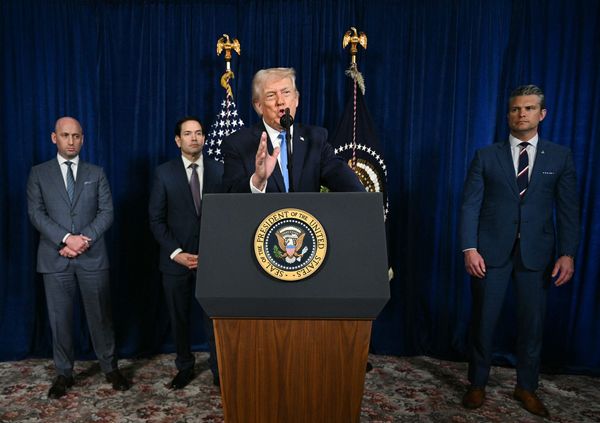Former Starbucks CEO Howard Schultz defended the coffee giant’s labor practices and denied union busting Wednesday in his testimony before a Senate committee chaired by Sen. Bernie Sanders. His appearance, along with his Starbucks coffee cup, came after a lengthy refusal that nearly led to a subpoena vote.
The hearing, named “No Company Is Above the Law: The Need to End Illegal Union Busting at Starbucks,” had Democrat senators criticizing Starbucks’ alleged labor-law violations and Republican senators defending the company’s actions, slamming Sanders for being biased, and criticizing the National Labor Relations Board. The crowd in attendance included Starbucks workers and union representatives.
Sanders said in his opening remarks that he would ask Schultz if he would commit to exchange proposals with the union as a first step toward collective bargaining. Schultz declined.
“What Starbucks is doing is not only trying to break unions, but even worse,” Sanders said. “They are trying to break the spirit of workers who are struggling to improve their lives. And that is unforgivable.”
During the testimony, Schultz said several times that Starbucks will abide by the law and respect workers’ right to unionize. He said Starbucks will prove NLRB complaints, totaling 80, are untrue allegations.
In response to Sen. Robert Casey, a Democrat from Pennsylvania who asked if Schultz supports a provision that allows for a tax break for a company’s anti-union expenses, the ex-Starbucks CEO said he supports the law — a common Schultz statement throughout the hearing.
“I support the law, and I also take offense with you categorizing me or Starbucks as a union buster when that is not true,” Schultz said.
Last month, Sanders, who just had taken the helm of Health, Education, Labor and Pensions Committee, requested Schultz testify about Starbucks’ alleged violations of federal labor law and said he planned to authorize a committee investigation into Starbucks and other corporations’ unlawful labor practices.
In a written statement submitted before the testimony, Schultz talked about Seattle-based Starbucks’ history, labor issues and how leadership under former CEO Kevin Johnson made the company lose its way.
Schultz reiterated Starbucks’ position that it respects the right of all workers to make their decisions about union representation. “Starbucks is committed to engaging in good faith collective bargaining for each store that has a union,” said Schultz, who handed the CEO role over to Laxman Narasimhan on March 20.
At the same time, Schultz added, Starbucks’ strength relies on the trust from the relationship between the company and its front-line workers.
Since the unionization movement began in November 2021, workers at more than 295 stores out of 16,000 nationwide have unionized. Schultz previously described unionization as placing a third party between the company and workers. The process led to exchanges of unfair labor complaints between the company and its workers.
So far, National Labor Relations Board has received 513 unfair labor practice cases against Starbucks and its law firm and at least 102 against the union, Starbucks Workers United.
In his written testimony, Schultz said that while the company has engaged in good faith bargaining with more than 350 negotiation sessions, Starbucks Workers United representatives haven’t.
In the testimony, Schultz said they have asked for multistore negotiations, “delayed or refused to attend meetings and insisted on unlawful preconditions” such as bargaining with representatives in a hybrid model using Zoom.
Union representatives have said that Starbucks’ refusal to negotiate with a hybrid model is a tactic to delay bargaining negotiations. So far, no operating store has signed a contract with the company.
The National Labor Relations Board’s general counsel on Monday said Starbucks violated labor law by refusing to bargain via Zoom.
Lakewood, California-based Starbucks worker Tyler Keeling said the union is ready to resume negotiations via Zoom.
“Now that it’s clear we have the right to bargain using a virtual component, we hope Starbucks is ready, too,” Keeling said.
Schultz, now serving on the Starbucks board, said that the company had lost its way before he returned in April 2022. Starbucks was relying on prior successes instead of “thinking entrepreneurially,” Schultz said. He added that leadership was focusing on Wall Street short-term targets as a priority instead of “playing the long game.”
“Starbucks had lost sight of what drove the company’s success — making our partners and customers proud — and that the company’s culture and its future were at significant risk,” Schultz said. Starbucks refers to its workers as partners.
Schultz took over the helm of Starbucks as interim CEO last year when then-CEO Johnson retired. In September, Schultz announced his successor, Narasimhan, the former CEO of consumer goods company Reckitt.
A similar situation occurred in 2008, when Schultz returned as CEO after eight years. He said that then-leadership had strayed Starbucks from its original brand.
Schultz’ journey to take the stand at the committee turned into a standoff between him and Sanders. Schultz twice declined the invitation to testify and asked for Chief Communications Officer AJ Jones II to be sent to testify instead. Schultz agreed to testify a day before Sanders held a subpoena vote.
“While Howard Schultz is a multibillionaire who runs a very profitable multinational corporation, he must understand that he and his company are not above the law,” Sanders said earlier this month.







